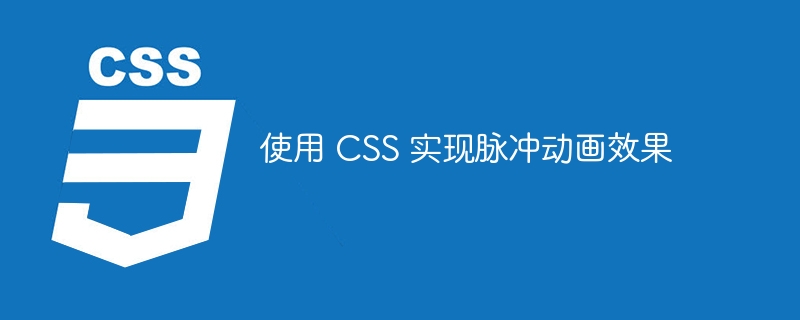Maison >interface Web >tutoriel CSS >Utilisez CSS pour implémenter des effets d'animation d'impulsion
Utilisez CSS pour implémenter des effets d'animation d'impulsion
- WBOYWBOYWBOYWBOYWBOYWBOYWBOYWBOYWBOYWBOYWBOYWBOYWBavant
- 2023-09-10 10:41:101713parcourir

Pour créer un effet pulsé à l'aide de CSS, vous pouvez essayer d'exécuter le code suivant
Exemple
Live Demo
<html>
<head>
<style>
.animated {
background-image: url(/css/images/logo.png);
background-repeat: no-repeat;
background-position: left top;
padding-top:95px;
margin-bottom:60px;
-webkit-animation-duration: 10s;
animation-duration: 10s;
-webkit-animation-fill-mode: both;
animation-fill-mode: both;
}
@-webkit-keyframes pulse {
0% { -webkit-transform: scale(1); }
50% { -webkit-transform: scale(1.1); }
100% { -webkit-transform: scale(1); }
}
@keyframes pulse {
0% { transform: scale(1); }
50% { transform: scale(1.1); }
100% { transform: scale(1); }
}
.pulse {
-webkit-animation-name: pulse;
animation-name: pulse;
}
</style>
</head>
<body>
<div id = "animated-example" class = "animated pulse"></div>
<button onclick = "myFunction()">Reload page</button>
<script>
function myFunction() {
location.reload();
}
</script>
</body>
</html>Ce qui précède est le contenu détaillé de. pour plus d'informations, suivez d'autres articles connexes sur le site Web de PHP en chinois!
Déclaration:
Cet article est reproduit dans:. en cas de violation, veuillez contacter admin@php.cn Supprimer
Article précédent:Est-il possible d’empêcher les utilisateurs de prendre des captures d’écran de pages Web ?Article suivant:Est-il possible d’empêcher les utilisateurs de prendre des captures d’écran de pages Web ?

